Reflective Practice, Models and Performance Indicators Project
VerifiedAdded on 2023/01/12
|11
|3199
|46
Project
AI Summary
This project delves into the crucial role of reflective practice within the healthcare sector, emphasizing its significance in personal and professional development. It explores various reflective models, such as the Gibbs model, outlining their stages and applications in analyzing experiences and improving work methods. The project examines the ways reflective practice is applied, including the use of reflective models and feedback mechanisms, and discusses its impact on skill enhancement and experience gain for healthcare professionals. It also focuses on practice themes, their relationship with reflection, and their role in underpinning learning and development within the healthcare setting. Furthermore, the project highlights the link between practice themes and performance indicators, illustrating how these indicators are used to evaluate performance against established guidelines, ultimately contributing to improved professional and personal outcomes for healthcare providers. The project emphasizes the importance of continuous learning and self-assessment in providing quality care.
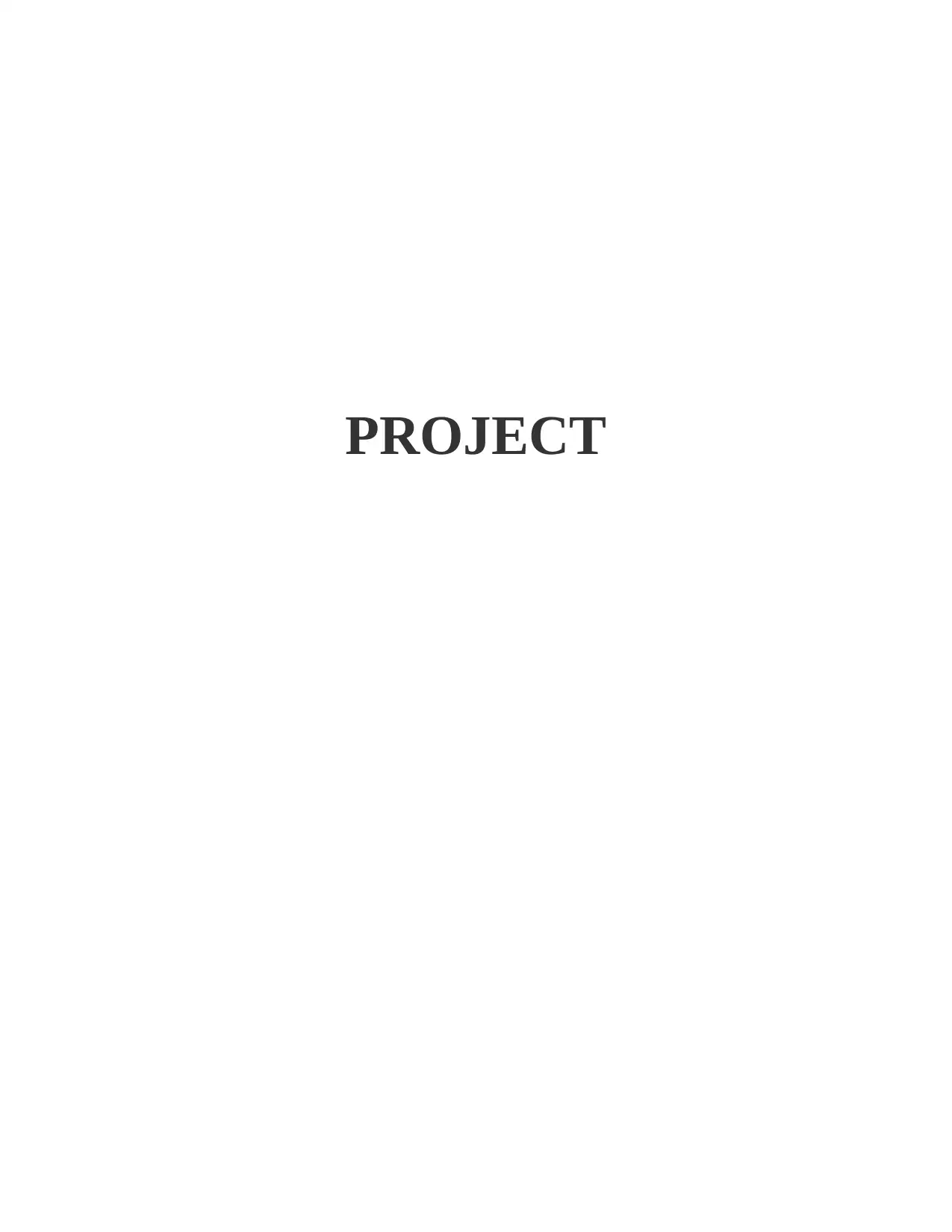
PROJECT
Paraphrase This Document
Need a fresh take? Get an instant paraphrase of this document with our AI Paraphraser
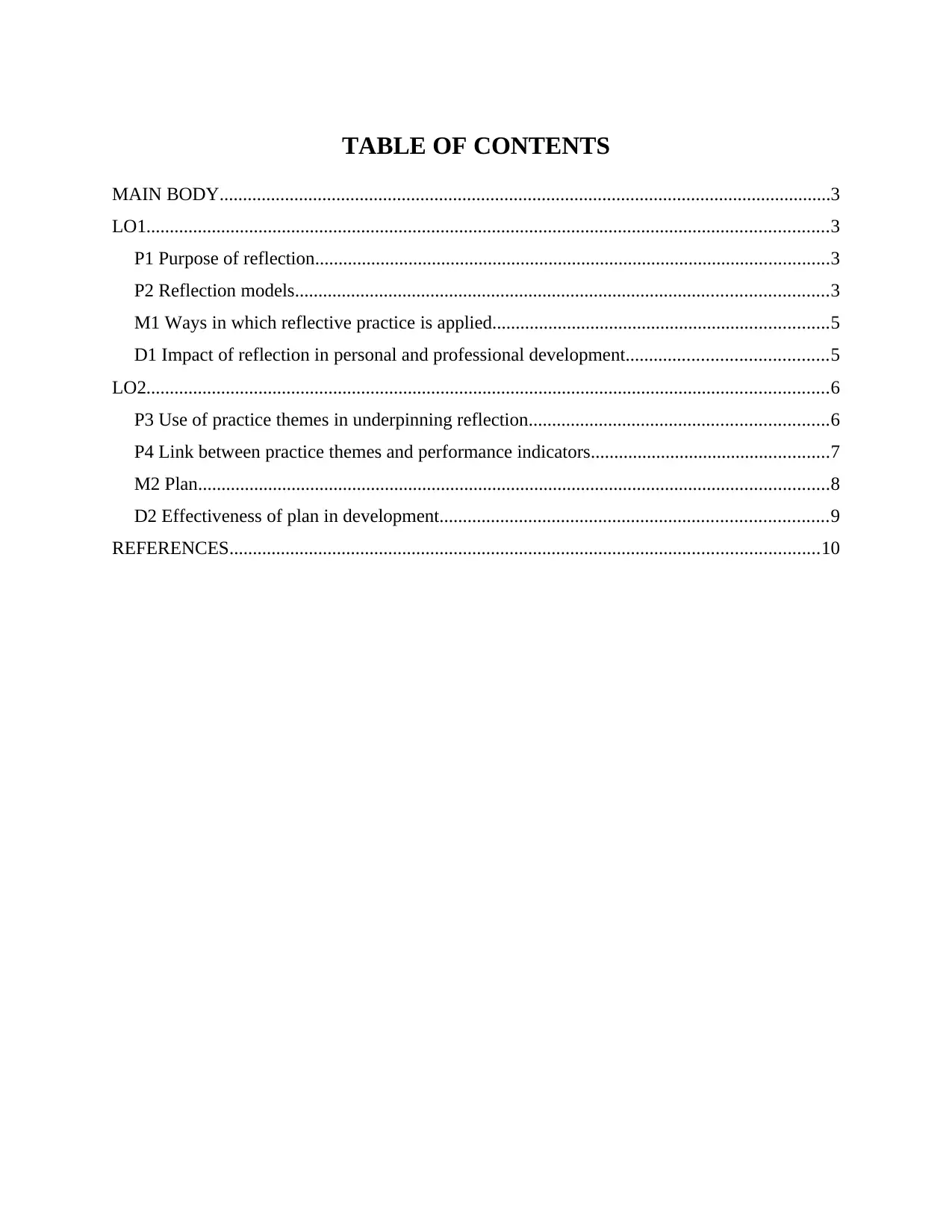
TABLE OF CONTENTS
MAIN BODY...................................................................................................................................3
LO1..................................................................................................................................................3
P1 Purpose of reflection..............................................................................................................3
P2 Reflection models..................................................................................................................3
M1 Ways in which reflective practice is applied........................................................................5
D1 Impact of reflection in personal and professional development...........................................5
LO2..................................................................................................................................................6
P3 Use of practice themes in underpinning reflection................................................................6
P4 Link between practice themes and performance indicators...................................................7
M2 Plan.......................................................................................................................................8
D2 Effectiveness of plan in development...................................................................................9
REFERENCES..............................................................................................................................10
MAIN BODY...................................................................................................................................3
LO1..................................................................................................................................................3
P1 Purpose of reflection..............................................................................................................3
P2 Reflection models..................................................................................................................3
M1 Ways in which reflective practice is applied........................................................................5
D1 Impact of reflection in personal and professional development...........................................5
LO2..................................................................................................................................................6
P3 Use of practice themes in underpinning reflection................................................................6
P4 Link between practice themes and performance indicators...................................................7
M2 Plan.......................................................................................................................................8
D2 Effectiveness of plan in development...................................................................................9
REFERENCES..............................................................................................................................10
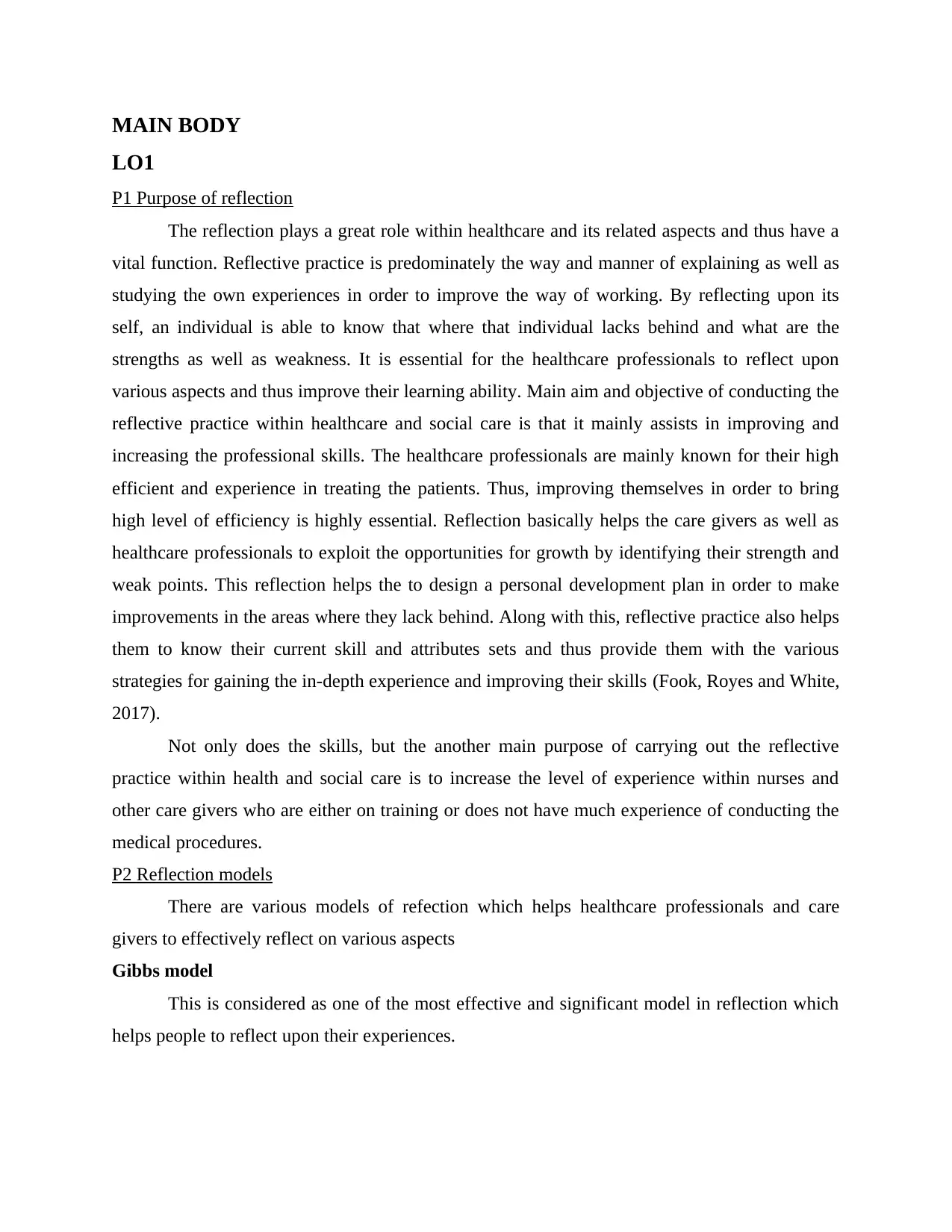
MAIN BODY
LO1
P1 Purpose of reflection
The reflection plays a great role within healthcare and its related aspects and thus have a
vital function. Reflective practice is predominately the way and manner of explaining as well as
studying the own experiences in order to improve the way of working. By reflecting upon its
self, an individual is able to know that where that individual lacks behind and what are the
strengths as well as weakness. It is essential for the healthcare professionals to reflect upon
various aspects and thus improve their learning ability. Main aim and objective of conducting the
reflective practice within healthcare and social care is that it mainly assists in improving and
increasing the professional skills. The healthcare professionals are mainly known for their high
efficient and experience in treating the patients. Thus, improving themselves in order to bring
high level of efficiency is highly essential. Reflection basically helps the care givers as well as
healthcare professionals to exploit the opportunities for growth by identifying their strength and
weak points. This reflection helps the to design a personal development plan in order to make
improvements in the areas where they lack behind. Along with this, reflective practice also helps
them to know their current skill and attributes sets and thus provide them with the various
strategies for gaining the in-depth experience and improving their skills (Fook, Royes and White,
2017).
Not only does the skills, but the another main purpose of carrying out the reflective
practice within health and social care is to increase the level of experience within nurses and
other care givers who are either on training or does not have much experience of conducting the
medical procedures.
P2 Reflection models
There are various models of refection which helps healthcare professionals and care
givers to effectively reflect on various aspects
Gibbs model
This is considered as one of the most effective and significant model in reflection which
helps people to reflect upon their experiences.
LO1
P1 Purpose of reflection
The reflection plays a great role within healthcare and its related aspects and thus have a
vital function. Reflective practice is predominately the way and manner of explaining as well as
studying the own experiences in order to improve the way of working. By reflecting upon its
self, an individual is able to know that where that individual lacks behind and what are the
strengths as well as weakness. It is essential for the healthcare professionals to reflect upon
various aspects and thus improve their learning ability. Main aim and objective of conducting the
reflective practice within healthcare and social care is that it mainly assists in improving and
increasing the professional skills. The healthcare professionals are mainly known for their high
efficient and experience in treating the patients. Thus, improving themselves in order to bring
high level of efficiency is highly essential. Reflection basically helps the care givers as well as
healthcare professionals to exploit the opportunities for growth by identifying their strength and
weak points. This reflection helps the to design a personal development plan in order to make
improvements in the areas where they lack behind. Along with this, reflective practice also helps
them to know their current skill and attributes sets and thus provide them with the various
strategies for gaining the in-depth experience and improving their skills (Fook, Royes and White,
2017).
Not only does the skills, but the another main purpose of carrying out the reflective
practice within health and social care is to increase the level of experience within nurses and
other care givers who are either on training or does not have much experience of conducting the
medical procedures.
P2 Reflection models
There are various models of refection which helps healthcare professionals and care
givers to effectively reflect on various aspects
Gibbs model
This is considered as one of the most effective and significant model in reflection which
helps people to reflect upon their experiences.
⊘ This is a preview!⊘
Do you want full access?
Subscribe today to unlock all pages.

Trusted by 1+ million students worldwide
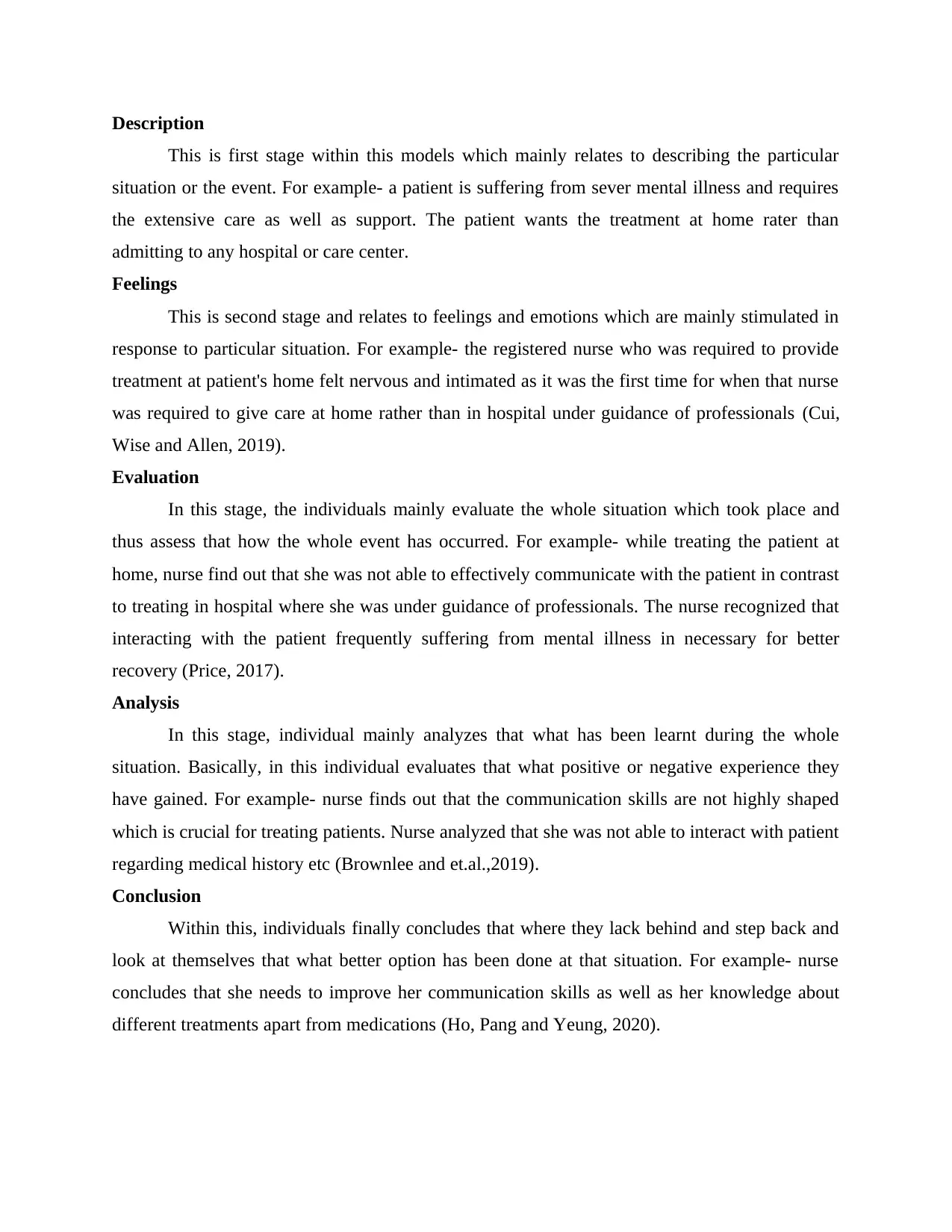
Description
This is first stage within this models which mainly relates to describing the particular
situation or the event. For example- a patient is suffering from sever mental illness and requires
the extensive care as well as support. The patient wants the treatment at home rater than
admitting to any hospital or care center.
Feelings
This is second stage and relates to feelings and emotions which are mainly stimulated in
response to particular situation. For example- the registered nurse who was required to provide
treatment at patient's home felt nervous and intimated as it was the first time for when that nurse
was required to give care at home rather than in hospital under guidance of professionals (Cui,
Wise and Allen, 2019).
Evaluation
In this stage, the individuals mainly evaluate the whole situation which took place and
thus assess that how the whole event has occurred. For example- while treating the patient at
home, nurse find out that she was not able to effectively communicate with the patient in contrast
to treating in hospital where she was under guidance of professionals. The nurse recognized that
interacting with the patient frequently suffering from mental illness in necessary for better
recovery (Price, 2017).
Analysis
In this stage, individual mainly analyzes that what has been learnt during the whole
situation. Basically, in this individual evaluates that what positive or negative experience they
have gained. For example- nurse finds out that the communication skills are not highly shaped
which is crucial for treating patients. Nurse analyzed that she was not able to interact with patient
regarding medical history etc (Brownlee and et.al.,2019).
Conclusion
Within this, individuals finally concludes that where they lack behind and step back and
look at themselves that what better option has been done at that situation. For example- nurse
concludes that she needs to improve her communication skills as well as her knowledge about
different treatments apart from medications (Ho, Pang and Yeung, 2020).
This is first stage within this models which mainly relates to describing the particular
situation or the event. For example- a patient is suffering from sever mental illness and requires
the extensive care as well as support. The patient wants the treatment at home rater than
admitting to any hospital or care center.
Feelings
This is second stage and relates to feelings and emotions which are mainly stimulated in
response to particular situation. For example- the registered nurse who was required to provide
treatment at patient's home felt nervous and intimated as it was the first time for when that nurse
was required to give care at home rather than in hospital under guidance of professionals (Cui,
Wise and Allen, 2019).
Evaluation
In this stage, the individuals mainly evaluate the whole situation which took place and
thus assess that how the whole event has occurred. For example- while treating the patient at
home, nurse find out that she was not able to effectively communicate with the patient in contrast
to treating in hospital where she was under guidance of professionals. The nurse recognized that
interacting with the patient frequently suffering from mental illness in necessary for better
recovery (Price, 2017).
Analysis
In this stage, individual mainly analyzes that what has been learnt during the whole
situation. Basically, in this individual evaluates that what positive or negative experience they
have gained. For example- nurse finds out that the communication skills are not highly shaped
which is crucial for treating patients. Nurse analyzed that she was not able to interact with patient
regarding medical history etc (Brownlee and et.al.,2019).
Conclusion
Within this, individuals finally concludes that where they lack behind and step back and
look at themselves that what better option has been done at that situation. For example- nurse
concludes that she needs to improve her communication skills as well as her knowledge about
different treatments apart from medications (Ho, Pang and Yeung, 2020).
Paraphrase This Document
Need a fresh take? Get an instant paraphrase of this document with our AI Paraphraser
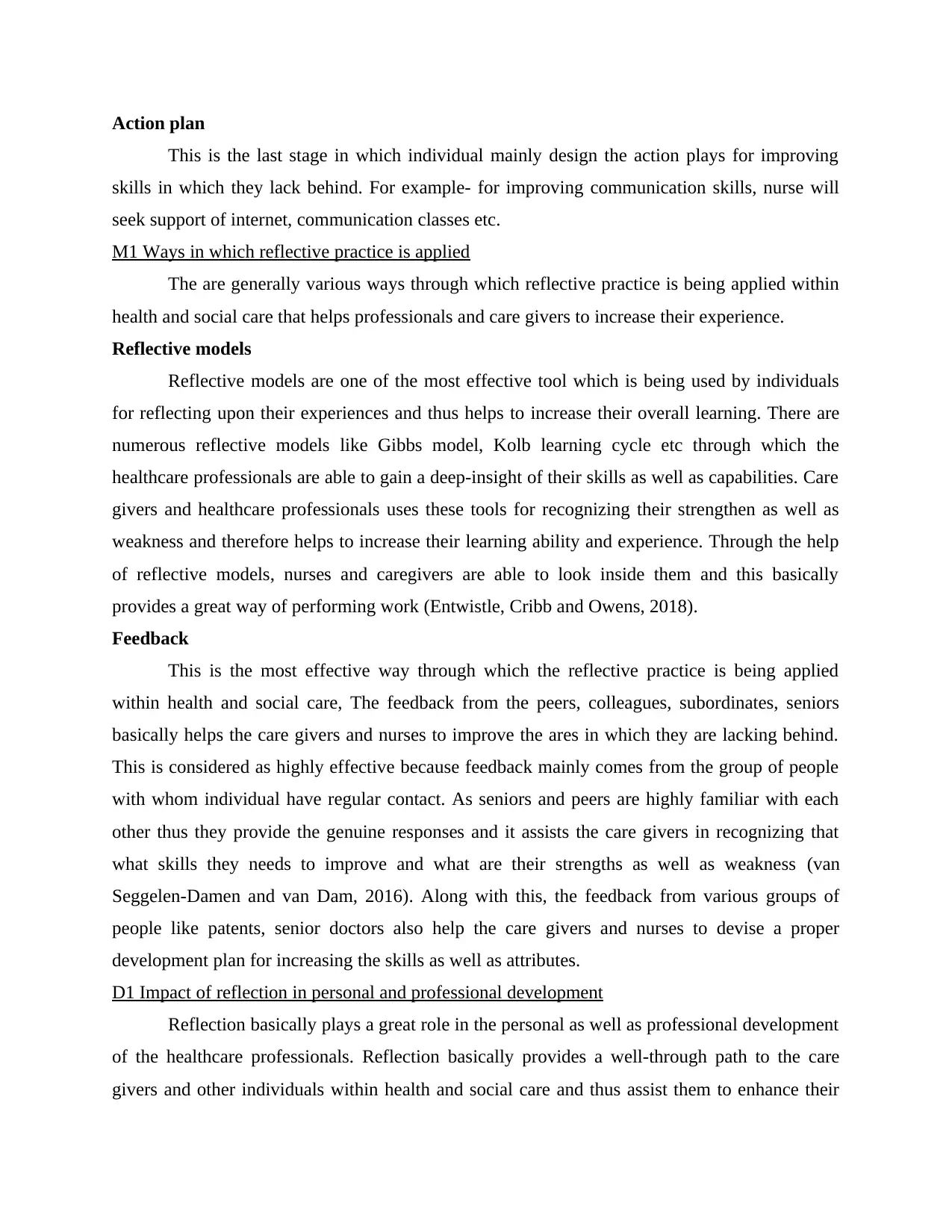
Action plan
This is the last stage in which individual mainly design the action plays for improving
skills in which they lack behind. For example- for improving communication skills, nurse will
seek support of internet, communication classes etc.
M1 Ways in which reflective practice is applied
The are generally various ways through which reflective practice is being applied within
health and social care that helps professionals and care givers to increase their experience.
Reflective models
Reflective models are one of the most effective tool which is being used by individuals
for reflecting upon their experiences and thus helps to increase their overall learning. There are
numerous reflective models like Gibbs model, Kolb learning cycle etc through which the
healthcare professionals are able to gain a deep-insight of their skills as well as capabilities. Care
givers and healthcare professionals uses these tools for recognizing their strengthen as well as
weakness and therefore helps to increase their learning ability and experience. Through the help
of reflective models, nurses and caregivers are able to look inside them and this basically
provides a great way of performing work (Entwistle, Cribb and Owens, 2018).
Feedback
This is the most effective way through which the reflective practice is being applied
within health and social care, The feedback from the peers, colleagues, subordinates, seniors
basically helps the care givers and nurses to improve the ares in which they are lacking behind.
This is considered as highly effective because feedback mainly comes from the group of people
with whom individual have regular contact. As seniors and peers are highly familiar with each
other thus they provide the genuine responses and it assists the care givers in recognizing that
what skills they needs to improve and what are their strengths as well as weakness (van
Seggelen-Damen and van Dam, 2016). Along with this, the feedback from various groups of
people like patents, senior doctors also help the care givers and nurses to devise a proper
development plan for increasing the skills as well as attributes.
D1 Impact of reflection in personal and professional development
Reflection basically plays a great role in the personal as well as professional development
of the healthcare professionals. Reflection basically provides a well-through path to the care
givers and other individuals within health and social care and thus assist them to enhance their
This is the last stage in which individual mainly design the action plays for improving
skills in which they lack behind. For example- for improving communication skills, nurse will
seek support of internet, communication classes etc.
M1 Ways in which reflective practice is applied
The are generally various ways through which reflective practice is being applied within
health and social care that helps professionals and care givers to increase their experience.
Reflective models
Reflective models are one of the most effective tool which is being used by individuals
for reflecting upon their experiences and thus helps to increase their overall learning. There are
numerous reflective models like Gibbs model, Kolb learning cycle etc through which the
healthcare professionals are able to gain a deep-insight of their skills as well as capabilities. Care
givers and healthcare professionals uses these tools for recognizing their strengthen as well as
weakness and therefore helps to increase their learning ability and experience. Through the help
of reflective models, nurses and caregivers are able to look inside them and this basically
provides a great way of performing work (Entwistle, Cribb and Owens, 2018).
Feedback
This is the most effective way through which the reflective practice is being applied
within health and social care, The feedback from the peers, colleagues, subordinates, seniors
basically helps the care givers and nurses to improve the ares in which they are lacking behind.
This is considered as highly effective because feedback mainly comes from the group of people
with whom individual have regular contact. As seniors and peers are highly familiar with each
other thus they provide the genuine responses and it assists the care givers in recognizing that
what skills they needs to improve and what are their strengths as well as weakness (van
Seggelen-Damen and van Dam, 2016). Along with this, the feedback from various groups of
people like patents, senior doctors also help the care givers and nurses to devise a proper
development plan for increasing the skills as well as attributes.
D1 Impact of reflection in personal and professional development
Reflection basically plays a great role in the personal as well as professional development
of the healthcare professionals. Reflection basically provides a well-through path to the care
givers and other individuals within health and social care and thus assist them to enhance their
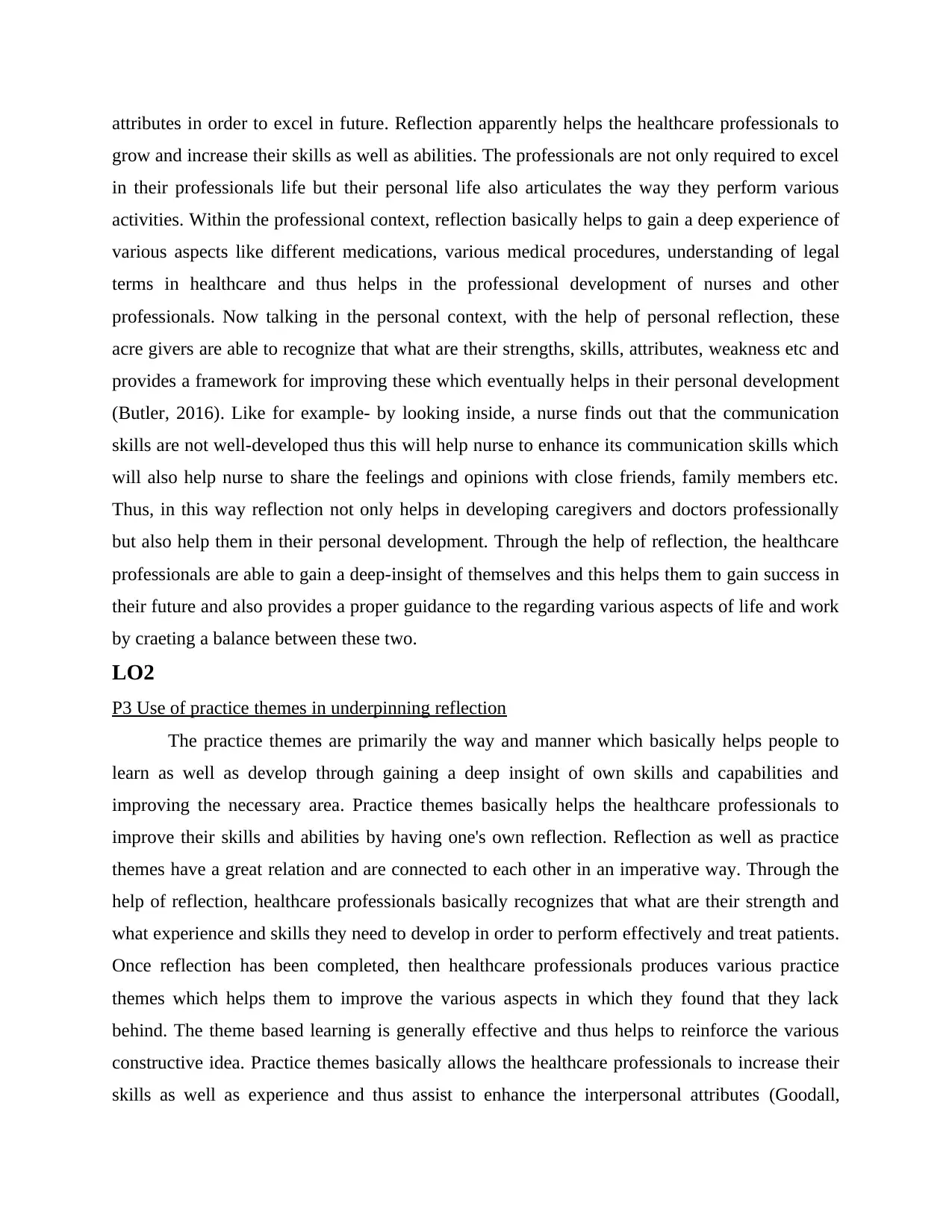
attributes in order to excel in future. Reflection apparently helps the healthcare professionals to
grow and increase their skills as well as abilities. The professionals are not only required to excel
in their professionals life but their personal life also articulates the way they perform various
activities. Within the professional context, reflection basically helps to gain a deep experience of
various aspects like different medications, various medical procedures, understanding of legal
terms in healthcare and thus helps in the professional development of nurses and other
professionals. Now talking in the personal context, with the help of personal reflection, these
acre givers are able to recognize that what are their strengths, skills, attributes, weakness etc and
provides a framework for improving these which eventually helps in their personal development
(Butler, 2016). Like for example- by looking inside, a nurse finds out that the communication
skills are not well-developed thus this will help nurse to enhance its communication skills which
will also help nurse to share the feelings and opinions with close friends, family members etc.
Thus, in this way reflection not only helps in developing caregivers and doctors professionally
but also help them in their personal development. Through the help of reflection, the healthcare
professionals are able to gain a deep-insight of themselves and this helps them to gain success in
their future and also provides a proper guidance to the regarding various aspects of life and work
by craeting a balance between these two.
LO2
P3 Use of practice themes in underpinning reflection
The practice themes are primarily the way and manner which basically helps people to
learn as well as develop through gaining a deep insight of own skills and capabilities and
improving the necessary area. Practice themes basically helps the healthcare professionals to
improve their skills and abilities by having one's own reflection. Reflection as well as practice
themes have a great relation and are connected to each other in an imperative way. Through the
help of reflection, healthcare professionals basically recognizes that what are their strength and
what experience and skills they need to develop in order to perform effectively and treat patients.
Once reflection has been completed, then healthcare professionals produces various practice
themes which helps them to improve the various aspects in which they found that they lack
behind. The theme based learning is generally effective and thus helps to reinforce the various
constructive idea. Practice themes basically allows the healthcare professionals to increase their
skills as well as experience and thus assist to enhance the interpersonal attributes (Goodall,
grow and increase their skills as well as abilities. The professionals are not only required to excel
in their professionals life but their personal life also articulates the way they perform various
activities. Within the professional context, reflection basically helps to gain a deep experience of
various aspects like different medications, various medical procedures, understanding of legal
terms in healthcare and thus helps in the professional development of nurses and other
professionals. Now talking in the personal context, with the help of personal reflection, these
acre givers are able to recognize that what are their strengths, skills, attributes, weakness etc and
provides a framework for improving these which eventually helps in their personal development
(Butler, 2016). Like for example- by looking inside, a nurse finds out that the communication
skills are not well-developed thus this will help nurse to enhance its communication skills which
will also help nurse to share the feelings and opinions with close friends, family members etc.
Thus, in this way reflection not only helps in developing caregivers and doctors professionally
but also help them in their personal development. Through the help of reflection, the healthcare
professionals are able to gain a deep-insight of themselves and this helps them to gain success in
their future and also provides a proper guidance to the regarding various aspects of life and work
by craeting a balance between these two.
LO2
P3 Use of practice themes in underpinning reflection
The practice themes are primarily the way and manner which basically helps people to
learn as well as develop through gaining a deep insight of own skills and capabilities and
improving the necessary area. Practice themes basically helps the healthcare professionals to
improve their skills and abilities by having one's own reflection. Reflection as well as practice
themes have a great relation and are connected to each other in an imperative way. Through the
help of reflection, healthcare professionals basically recognizes that what are their strength and
what experience and skills they need to develop in order to perform effectively and treat patients.
Once reflection has been completed, then healthcare professionals produces various practice
themes which helps them to improve the various aspects in which they found that they lack
behind. The theme based learning is generally effective and thus helps to reinforce the various
constructive idea. Practice themes basically allows the healthcare professionals to increase their
skills as well as experience and thus assist to enhance the interpersonal attributes (Goodall,
⊘ This is a preview!⊘
Do you want full access?
Subscribe today to unlock all pages.

Trusted by 1+ million students worldwide
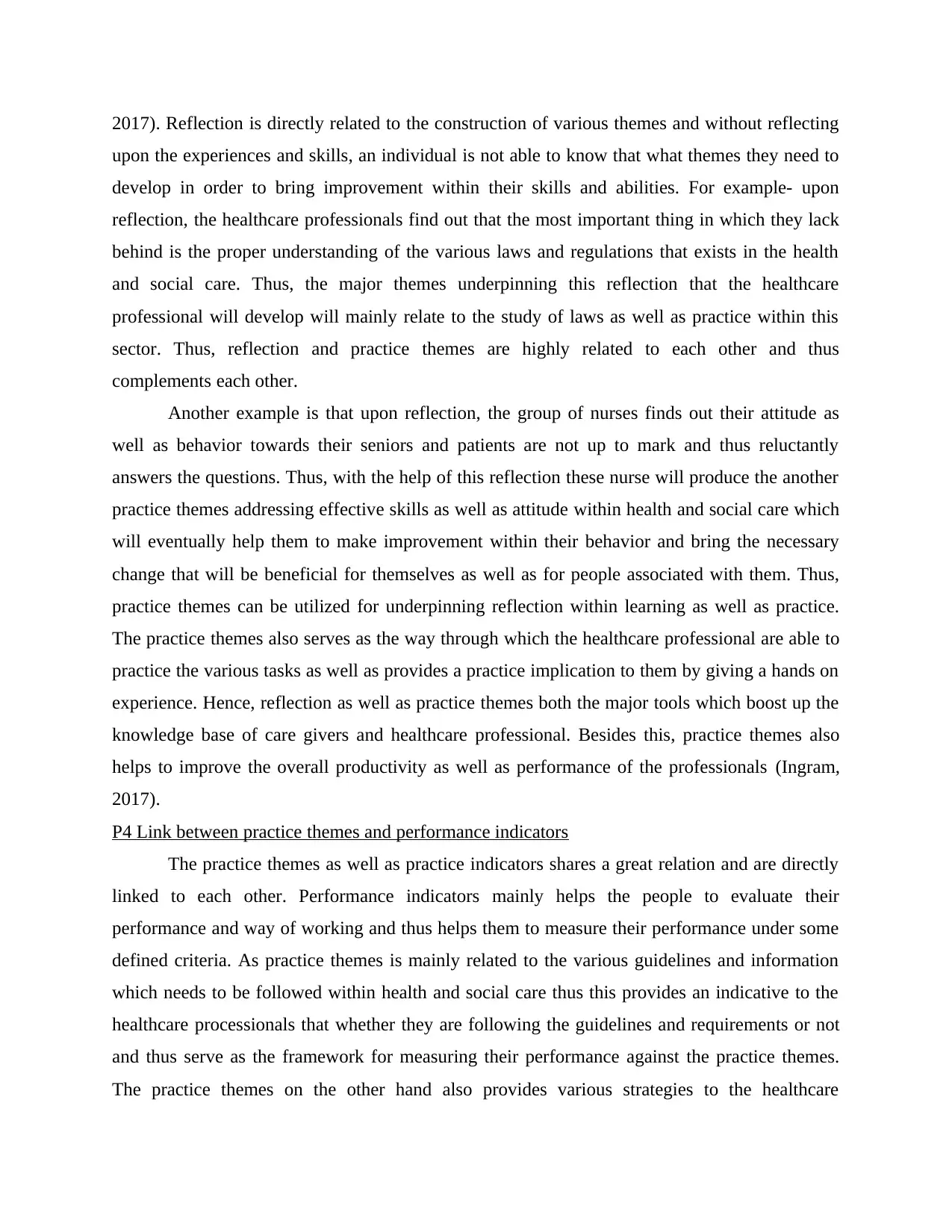
2017). Reflection is directly related to the construction of various themes and without reflecting
upon the experiences and skills, an individual is not able to know that what themes they need to
develop in order to bring improvement within their skills and abilities. For example- upon
reflection, the healthcare professionals find out that the most important thing in which they lack
behind is the proper understanding of the various laws and regulations that exists in the health
and social care. Thus, the major themes underpinning this reflection that the healthcare
professional will develop will mainly relate to the study of laws as well as practice within this
sector. Thus, reflection and practice themes are highly related to each other and thus
complements each other.
Another example is that upon reflection, the group of nurses finds out their attitude as
well as behavior towards their seniors and patients are not up to mark and thus reluctantly
answers the questions. Thus, with the help of this reflection these nurse will produce the another
practice themes addressing effective skills as well as attitude within health and social care which
will eventually help them to make improvement within their behavior and bring the necessary
change that will be beneficial for themselves as well as for people associated with them. Thus,
practice themes can be utilized for underpinning reflection within learning as well as practice.
The practice themes also serves as the way through which the healthcare professional are able to
practice the various tasks as well as provides a practice implication to them by giving a hands on
experience. Hence, reflection as well as practice themes both the major tools which boost up the
knowledge base of care givers and healthcare professional. Besides this, practice themes also
helps to improve the overall productivity as well as performance of the professionals (Ingram,
2017).
P4 Link between practice themes and performance indicators
The practice themes as well as practice indicators shares a great relation and are directly
linked to each other. Performance indicators mainly helps the people to evaluate their
performance and way of working and thus helps them to measure their performance under some
defined criteria. As practice themes is mainly related to the various guidelines and information
which needs to be followed within health and social care thus this provides an indicative to the
healthcare processionals that whether they are following the guidelines and requirements or not
and thus serve as the framework for measuring their performance against the practice themes.
The practice themes on the other hand also provides various strategies to the healthcare
upon the experiences and skills, an individual is not able to know that what themes they need to
develop in order to bring improvement within their skills and abilities. For example- upon
reflection, the healthcare professionals find out that the most important thing in which they lack
behind is the proper understanding of the various laws and regulations that exists in the health
and social care. Thus, the major themes underpinning this reflection that the healthcare
professional will develop will mainly relate to the study of laws as well as practice within this
sector. Thus, reflection and practice themes are highly related to each other and thus
complements each other.
Another example is that upon reflection, the group of nurses finds out their attitude as
well as behavior towards their seniors and patients are not up to mark and thus reluctantly
answers the questions. Thus, with the help of this reflection these nurse will produce the another
practice themes addressing effective skills as well as attitude within health and social care which
will eventually help them to make improvement within their behavior and bring the necessary
change that will be beneficial for themselves as well as for people associated with them. Thus,
practice themes can be utilized for underpinning reflection within learning as well as practice.
The practice themes also serves as the way through which the healthcare professional are able to
practice the various tasks as well as provides a practice implication to them by giving a hands on
experience. Hence, reflection as well as practice themes both the major tools which boost up the
knowledge base of care givers and healthcare professional. Besides this, practice themes also
helps to improve the overall productivity as well as performance of the professionals (Ingram,
2017).
P4 Link between practice themes and performance indicators
The practice themes as well as practice indicators shares a great relation and are directly
linked to each other. Performance indicators mainly helps the people to evaluate their
performance and way of working and thus helps them to measure their performance under some
defined criteria. As practice themes is mainly related to the various guidelines and information
which needs to be followed within health and social care thus this provides an indicative to the
healthcare processionals that whether they are following the guidelines and requirements or not
and thus serve as the framework for measuring their performance against the practice themes.
The practice themes on the other hand also provides various strategies to the healthcare
Paraphrase This Document
Need a fresh take? Get an instant paraphrase of this document with our AI Paraphraser
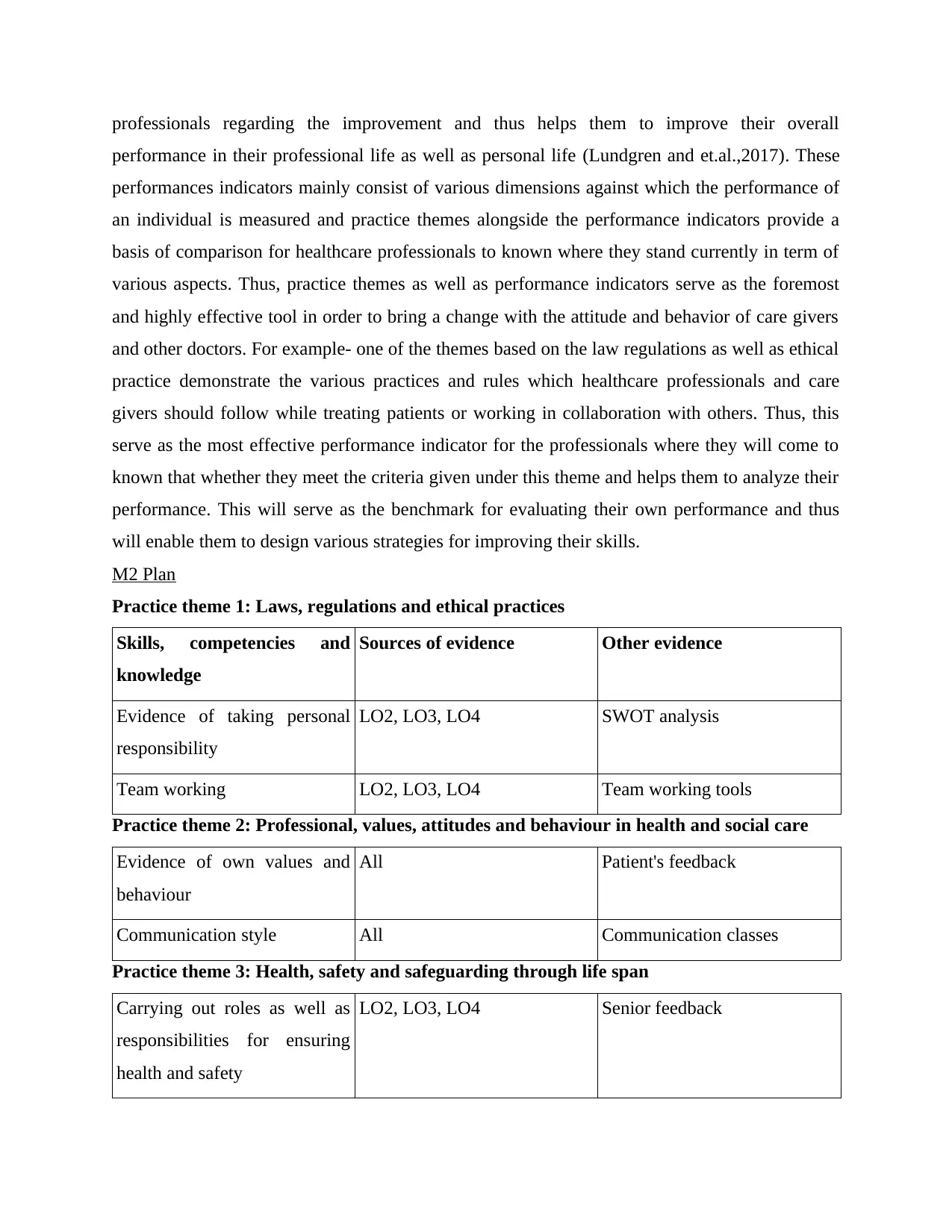
professionals regarding the improvement and thus helps them to improve their overall
performance in their professional life as well as personal life (Lundgren and et.al.,2017). These
performances indicators mainly consist of various dimensions against which the performance of
an individual is measured and practice themes alongside the performance indicators provide a
basis of comparison for healthcare professionals to known where they stand currently in term of
various aspects. Thus, practice themes as well as performance indicators serve as the foremost
and highly effective tool in order to bring a change with the attitude and behavior of care givers
and other doctors. For example- one of the themes based on the law regulations as well as ethical
practice demonstrate the various practices and rules which healthcare professionals and care
givers should follow while treating patients or working in collaboration with others. Thus, this
serve as the most effective performance indicator for the professionals where they will come to
known that whether they meet the criteria given under this theme and helps them to analyze their
performance. This will serve as the benchmark for evaluating their own performance and thus
will enable them to design various strategies for improving their skills.
M2 Plan
Practice theme 1: Laws, regulations and ethical practices
Skills, competencies and
knowledge
Sources of evidence Other evidence
Evidence of taking personal
responsibility
LO2, LO3, LO4 SWOT analysis
Team working LO2, LO3, LO4 Team working tools
Practice theme 2: Professional, values, attitudes and behaviour in health and social care
Evidence of own values and
behaviour
All Patient's feedback
Communication style All Communication classes
Practice theme 3: Health, safety and safeguarding through life span
Carrying out roles as well as
responsibilities for ensuring
health and safety
LO2, LO3, LO4 Senior feedback
performance in their professional life as well as personal life (Lundgren and et.al.,2017). These
performances indicators mainly consist of various dimensions against which the performance of
an individual is measured and practice themes alongside the performance indicators provide a
basis of comparison for healthcare professionals to known where they stand currently in term of
various aspects. Thus, practice themes as well as performance indicators serve as the foremost
and highly effective tool in order to bring a change with the attitude and behavior of care givers
and other doctors. For example- one of the themes based on the law regulations as well as ethical
practice demonstrate the various practices and rules which healthcare professionals and care
givers should follow while treating patients or working in collaboration with others. Thus, this
serve as the most effective performance indicator for the professionals where they will come to
known that whether they meet the criteria given under this theme and helps them to analyze their
performance. This will serve as the benchmark for evaluating their own performance and thus
will enable them to design various strategies for improving their skills.
M2 Plan
Practice theme 1: Laws, regulations and ethical practices
Skills, competencies and
knowledge
Sources of evidence Other evidence
Evidence of taking personal
responsibility
LO2, LO3, LO4 SWOT analysis
Team working LO2, LO3, LO4 Team working tools
Practice theme 2: Professional, values, attitudes and behaviour in health and social care
Evidence of own values and
behaviour
All Patient's feedback
Communication style All Communication classes
Practice theme 3: Health, safety and safeguarding through life span
Carrying out roles as well as
responsibilities for ensuring
health and safety
LO2, LO3, LO4 Senior feedback
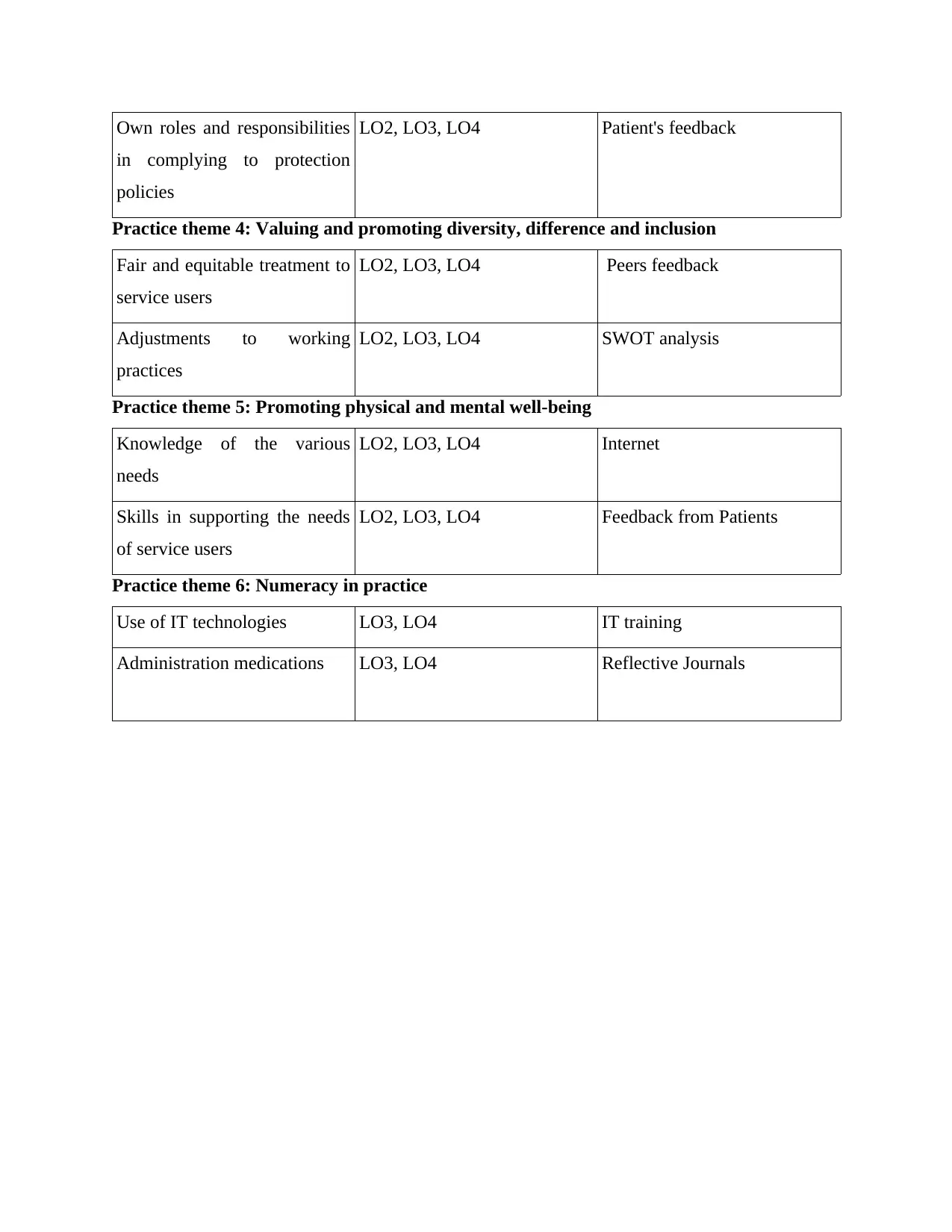
Own roles and responsibilities
in complying to protection
policies
LO2, LO3, LO4 Patient's feedback
Practice theme 4: Valuing and promoting diversity, difference and inclusion
Fair and equitable treatment to
service users
LO2, LO3, LO4 Peers feedback
Adjustments to working
practices
LO2, LO3, LO4 SWOT analysis
Practice theme 5: Promoting physical and mental well-being
Knowledge of the various
needs
LO2, LO3, LO4 Internet
Skills in supporting the needs
of service users
LO2, LO3, LO4 Feedback from Patients
Practice theme 6: Numeracy in practice
Use of IT technologies LO3, LO4 IT training
Administration medications LO3, LO4 Reflective Journals
in complying to protection
policies
LO2, LO3, LO4 Patient's feedback
Practice theme 4: Valuing and promoting diversity, difference and inclusion
Fair and equitable treatment to
service users
LO2, LO3, LO4 Peers feedback
Adjustments to working
practices
LO2, LO3, LO4 SWOT analysis
Practice theme 5: Promoting physical and mental well-being
Knowledge of the various
needs
LO2, LO3, LO4 Internet
Skills in supporting the needs
of service users
LO2, LO3, LO4 Feedback from Patients
Practice theme 6: Numeracy in practice
Use of IT technologies LO3, LO4 IT training
Administration medications LO3, LO4 Reflective Journals
⊘ This is a preview!⊘
Do you want full access?
Subscribe today to unlock all pages.

Trusted by 1+ million students worldwide
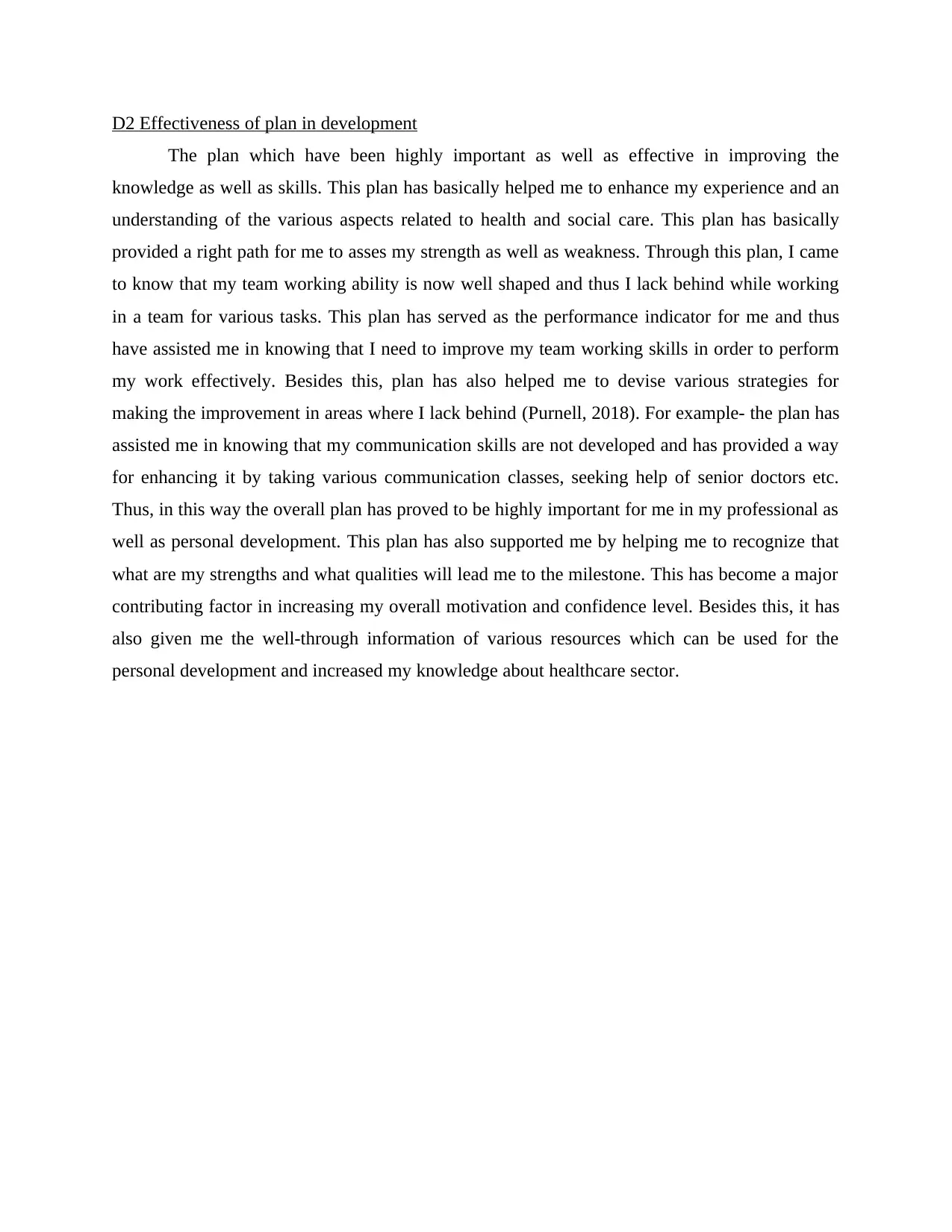
D2 Effectiveness of plan in development
The plan which have been highly important as well as effective in improving the
knowledge as well as skills. This plan has basically helped me to enhance my experience and an
understanding of the various aspects related to health and social care. This plan has basically
provided a right path for me to asses my strength as well as weakness. Through this plan, I came
to know that my team working ability is now well shaped and thus I lack behind while working
in a team for various tasks. This plan has served as the performance indicator for me and thus
have assisted me in knowing that I need to improve my team working skills in order to perform
my work effectively. Besides this, plan has also helped me to devise various strategies for
making the improvement in areas where I lack behind (Purnell, 2018). For example- the plan has
assisted me in knowing that my communication skills are not developed and has provided a way
for enhancing it by taking various communication classes, seeking help of senior doctors etc.
Thus, in this way the overall plan has proved to be highly important for me in my professional as
well as personal development. This plan has also supported me by helping me to recognize that
what are my strengths and what qualities will lead me to the milestone. This has become a major
contributing factor in increasing my overall motivation and confidence level. Besides this, it has
also given me the well-through information of various resources which can be used for the
personal development and increased my knowledge about healthcare sector.
The plan which have been highly important as well as effective in improving the
knowledge as well as skills. This plan has basically helped me to enhance my experience and an
understanding of the various aspects related to health and social care. This plan has basically
provided a right path for me to asses my strength as well as weakness. Through this plan, I came
to know that my team working ability is now well shaped and thus I lack behind while working
in a team for various tasks. This plan has served as the performance indicator for me and thus
have assisted me in knowing that I need to improve my team working skills in order to perform
my work effectively. Besides this, plan has also helped me to devise various strategies for
making the improvement in areas where I lack behind (Purnell, 2018). For example- the plan has
assisted me in knowing that my communication skills are not developed and has provided a way
for enhancing it by taking various communication classes, seeking help of senior doctors etc.
Thus, in this way the overall plan has proved to be highly important for me in my professional as
well as personal development. This plan has also supported me by helping me to recognize that
what are my strengths and what qualities will lead me to the milestone. This has become a major
contributing factor in increasing my overall motivation and confidence level. Besides this, it has
also given me the well-through information of various resources which can be used for the
personal development and increased my knowledge about healthcare sector.
Paraphrase This Document
Need a fresh take? Get an instant paraphrase of this document with our AI Paraphraser
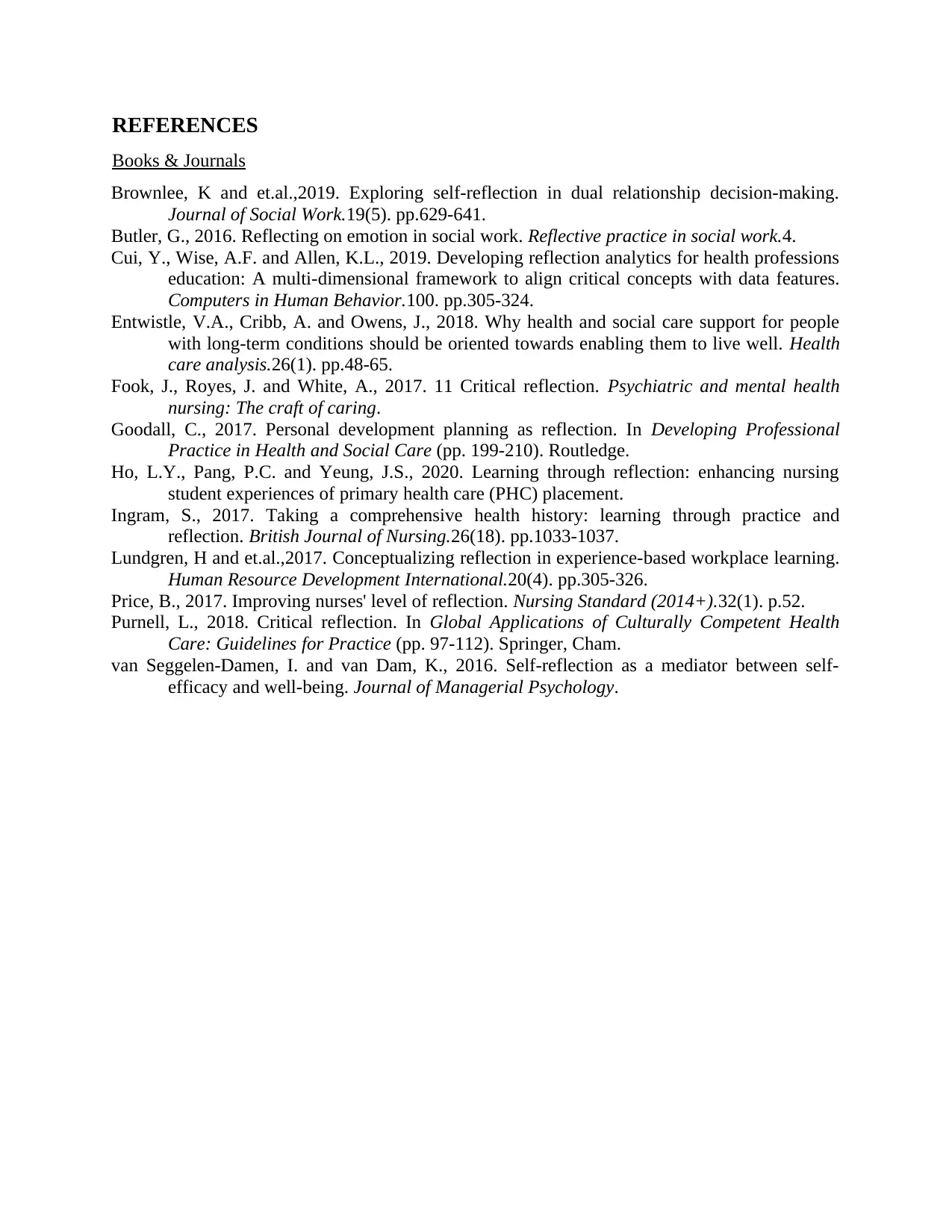
REFERENCES
Books & Journals
Brownlee, K and et.al.,2019. Exploring self-reflection in dual relationship decision-making.
Journal of Social Work.19(5). pp.629-641.
Butler, G., 2016. Reflecting on emotion in social work. Reflective practice in social work.4.
Cui, Y., Wise, A.F. and Allen, K.L., 2019. Developing reflection analytics for health professions
education: A multi-dimensional framework to align critical concepts with data features.
Computers in Human Behavior.100. pp.305-324.
Entwistle, V.A., Cribb, A. and Owens, J., 2018. Why health and social care support for people
with long-term conditions should be oriented towards enabling them to live well. Health
care analysis.26(1). pp.48-65.
Fook, J., Royes, J. and White, A., 2017. 11 Critical reflection. Psychiatric and mental health
nursing: The craft of caring.
Goodall, C., 2017. Personal development planning as reflection. In Developing Professional
Practice in Health and Social Care (pp. 199-210). Routledge.
Ho, L.Y., Pang, P.C. and Yeung, J.S., 2020. Learning through reflection: enhancing nursing
student experiences of primary health care (PHC) placement.
Ingram, S., 2017. Taking a comprehensive health history: learning through practice and
reflection. British Journal of Nursing.26(18). pp.1033-1037.
Lundgren, H and et.al.,2017. Conceptualizing reflection in experience-based workplace learning.
Human Resource Development International.20(4). pp.305-326.
Price, B., 2017. Improving nurses' level of reflection. Nursing Standard (2014+).32(1). p.52.
Purnell, L., 2018. Critical reflection. In Global Applications of Culturally Competent Health
Care: Guidelines for Practice (pp. 97-112). Springer, Cham.
van Seggelen-Damen, I. and van Dam, K., 2016. Self-reflection as a mediator between self-
efficacy and well-being. Journal of Managerial Psychology.
Books & Journals
Brownlee, K and et.al.,2019. Exploring self-reflection in dual relationship decision-making.
Journal of Social Work.19(5). pp.629-641.
Butler, G., 2016. Reflecting on emotion in social work. Reflective practice in social work.4.
Cui, Y., Wise, A.F. and Allen, K.L., 2019. Developing reflection analytics for health professions
education: A multi-dimensional framework to align critical concepts with data features.
Computers in Human Behavior.100. pp.305-324.
Entwistle, V.A., Cribb, A. and Owens, J., 2018. Why health and social care support for people
with long-term conditions should be oriented towards enabling them to live well. Health
care analysis.26(1). pp.48-65.
Fook, J., Royes, J. and White, A., 2017. 11 Critical reflection. Psychiatric and mental health
nursing: The craft of caring.
Goodall, C., 2017. Personal development planning as reflection. In Developing Professional
Practice in Health and Social Care (pp. 199-210). Routledge.
Ho, L.Y., Pang, P.C. and Yeung, J.S., 2020. Learning through reflection: enhancing nursing
student experiences of primary health care (PHC) placement.
Ingram, S., 2017. Taking a comprehensive health history: learning through practice and
reflection. British Journal of Nursing.26(18). pp.1033-1037.
Lundgren, H and et.al.,2017. Conceptualizing reflection in experience-based workplace learning.
Human Resource Development International.20(4). pp.305-326.
Price, B., 2017. Improving nurses' level of reflection. Nursing Standard (2014+).32(1). p.52.
Purnell, L., 2018. Critical reflection. In Global Applications of Culturally Competent Health
Care: Guidelines for Practice (pp. 97-112). Springer, Cham.
van Seggelen-Damen, I. and van Dam, K., 2016. Self-reflection as a mediator between self-
efficacy and well-being. Journal of Managerial Psychology.
1 out of 11
Related Documents
Your All-in-One AI-Powered Toolkit for Academic Success.
+13062052269
info@desklib.com
Available 24*7 on WhatsApp / Email
![[object Object]](/_next/static/media/star-bottom.7253800d.svg)
Unlock your academic potential
Copyright © 2020–2026 A2Z Services. All Rights Reserved. Developed and managed by ZUCOL.





